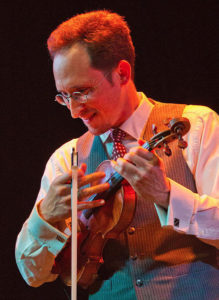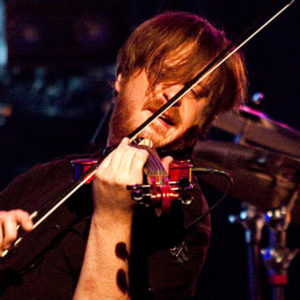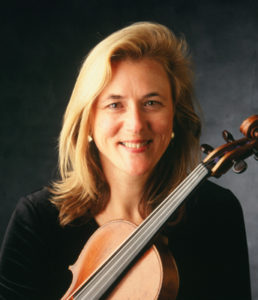Turning foreign languages into close dialects…
“Berkeley Symphony and Friends” had their fourth concert this year at the Piedmont Center for the Arts. Last Sunday, March 11, an accomplished foursome forged new music out of professionalism and whimsey from very different branches of the musical tree.
PCA founding member Gray Cathrall welcomed a packed audience to the hall and to this series, curated by Berkeley Symphony Executive Director René Mandel. “This series is now in its fifth year,” said Gray. “It was a gamble five years ago… but now we have a full house.”
Members of Vitamin Em, this string quartet was made up of four gifted musician/composers who like to go off script. Before those unscripted forays they eased into the evening with a traditional sort of blessing, Mozart’s warmth-filled Divertimento in D major. This was a tight and joyous intertwining of first-rate performers. Playing the first violin part,

Evan Price brought gentle certainty to his leans and impetuosity to his runs. Along with his classical training, Price is a fiddler nonpareil (as in Irish and folk fiddling), and has won many awards and played for ten years with the famed Turtle Island Quartet. Matthew Szemela was direct and rich in the lower violin part, giving his line a depth that impelled delicious harmonies.
Violist Emily Onderdonk anchored the center, bringing tight focus and a rich golden sound to her viola line. And Dr. Alex Kelly was their cellist, nimble and bright in his top register and at the bottom invoking the solidity of mountains.
The Andante was pure gravy, a slow movement of such beauty that we just knew that everything was going to be all right. And after this bed-time story the Presto showed how these pros liked to punch it up.

Matthew Szemela welcomed us and spoke about his departure from strict classicism.
“It was a milestone for me when I stopped looking at classical and jazz and rock and other genres as different languages, and instead as dialects of the same language. The next piece is “Fancy Lady” by Billy Preston, arranged by Emily Onderdonk. Preston pairs well with Mozart, because concerts are celebrations, right? Not wakes for dead composers! Emily, would you like to add anything?”
“It’s funky and R&B and Soul,” said the violist. “I can’t say more except its kind of a mash-up.”
Like Mozart, Billy Preston had that golden thread, an absolute faith in the human heart. Onderdonk’s arrangement began with viola tremolos and high violin shrieks and a deeply felt cello line, before getting down and “funky.” After that Kelly played his cello like a stand-up bass with fat plucks and slaps, while Price and Onderdonk lilted out the rhythm and Szemela made his violin zing. As promised, this was a celebration.
And then came a work that was celebrated in its own era, and newly re-arranged by Szemela, the “Spring” quarto from Antonio Vivaldi’s Four Seasons. Szemela took the part of violin soloist, switching to an electric six-string violin that was built for him in New York. “Because I’m the violin solo, that leaves an empty chair [gestures to first violin chair]. I’ve asked Berkeley Symphony’s René Mandel to sit in for this… I’ve left Vivaldi alone, because you can’t change a single note, but I’m including my own feelings of Spring.”
Using several pedals, Szemela created effects and layers, with low overlapping notes (and his new bottom string was deep into cello territory) and high tremolos turned into the birdcalls of spring. There was blue-grass and light pizzicato spatters over rhythm tracks. And there were bow attacks turned into heavy metal “mwah’s” and baroque Vivaldi trills peeking over the mix of dirty rock chords.
As he played Szemela turned and gathered the others in with “two…three…four!” and without pause they were playing Vivaldi’s original and enchanting “Spring.” This was a celebration of rebirth and newness, and as Vivaldi himself was a virtuoso violinist, it was written so that Szemela would shine.
The second movement had a jazz preamble and smooth joins, and the third was a chance for some ole time fiddle playing and long improvisations and then a seamless join into the timeless 1721 notes. These players, aided and abetted by Mandel, had an infectious energy that reminded us of the universality of art across genres and time.

After intermission they returned for five pieces that were a classical quartet’s lens on modern popular music, all arranged by Onderdonk. “They’re really fun,” she said. “In ‘Phoenix’ by Annbjørg Lien, this is our classical roots meets fiddle fun from far away Norway.”
Price gave us explosive figures and Irish scales (well, I suppose they were Norwegian but sounded similar), and Szemela laid down a rhythm track. The cello and viola lines had the slow overlaps of the sea, and then they all powered up for dumbek rhythms and golden plucks.
“Spinning Wheel” took the Blood, Sweat and Tears classic and added choo-choo chords and a wicked high violin riff and even mashed up bits of children’s song. And “Hasse A’s” was a foot-stomping romp in a Swedish sensibility. “Mercy, mercy, mercy” gave us a blue-grass cover of a big band favorite, and then they ended with Tower of Power’s “Don’t Change Horses (In the Middle of a Stream),” with a hair-raising “power up” and a funk barnyard sound. This was generous music, visceral and thoughtful at the same time, with room for improv solos and wild high discords and low grinding cello.
After standing ovations, they returned for an encore of “Shake it Up,” and that would have been perfect for a dance floor.
Next up at the Piedmont Center for the Arts the ProMusica Trio will join narrator Jerrold Rishe for “Napoleon: In Deeds and Music.” This thought-provoking interpretation of music and history will be held Saturday, March 24 at 4:00 p.m. at 801 Magnolia Ave, Piedmont. See piedmontcenterforthearts.org for information and tickets.
—Adam Broner
Photos of Matthew Szemela, Emily Onderdonk and Evan Price courtesy of the artists’ websites.
